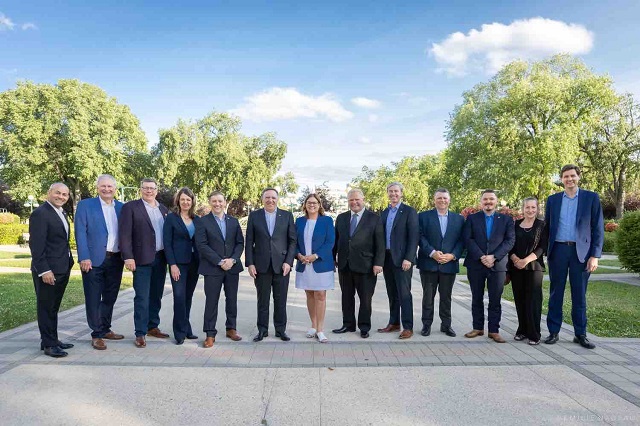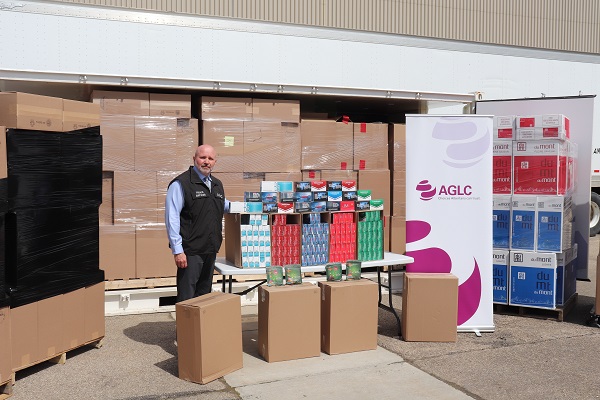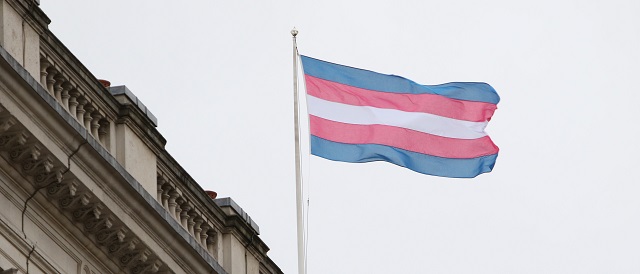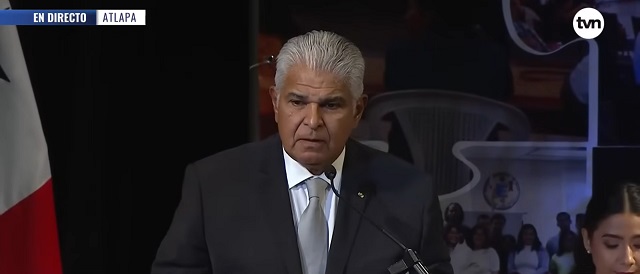Alberta
Canada’s Premiers beginning to back Canadian energy

News release from Project Confederation
Alberta Premier Danielle Smith was on a mission last week and had three things on her mind: energy, energy, energy.
The interesting thing is, many of the other provinces now seem to be on the same page too.
Energy is a policy area that has always been a flashpoint for trouble for the federal government and we’ve seen an ever-increasing number of disputes developing in recent years, deteriorating interprovincial relations and creating constitutional struggles.
The most recent argument started last Friday when Premier Smith met with Prime Minister Justin Trudeau in Calgary to talk about – you guessed it! – energy policy.
Trudeau has announced several ambitious climate policies that will drive energy costs up.
These include aggressive net-zero emissions electricity targets that are going to make power at least 40% more expensive, cost $52 billion for infrastructure alone, and another $35 billion in economic activity.
They’ve also announced an emissions cap on the oil and gas sector in western Canada – which is effectively a production cap, limiting the ability of producers to up their production in order to meet rising global demand.
Smith isn’t going along with these destructive policies.
Natural resource development is the sole jurisdiction of the provinces, not the federal government, and Smith says that Alberta will not be a doormat for federal climate policies that are going to decimate its economy.
She made it clear she will do whatever is necessary to protect Alberta’s interests.
After this bout with Trudeau, she headed out to Winnipeg for the 2023 Summer Meeting of Canada’s Premiers.
Once again, Smith hammered on Ottawa’s aggressive targets and the impact they will have on the economies of the federation – not just Alberta.
Next, she headed to the LNG2023 Conference in Vancouver, looking to establish new export markets for Alberta’s Liquefied Natural Gas (LNG) – a major source of tension between the federal government and the provinces.
Smith pointed out that Western Canada wants the ability to export LNG to fulfill rising global demand, a resource that Canada has in abundance:
“With the right infrastructure in place, Western Canada would become a sought-after supplier for both Asia and Europe.”
Notably, federal Natural Resources Minister Jonathan Wilkinson didn’t even show up to the conference, instead sending Tourism Minister Randy Boissonnault.
Perhaps most importantly though, Alberta no longer stands alone.
The federal government has intruded so much into provincial jurisdiction on so many issues, that more and more provinces are pushing back.
At the start of her trip, Smith predicted that she would have a few allies.
“I can tell you the thing that has surprised me the most is that it doesn’t matter what political stripe the premiers have, every single one of them is frustrated with federal interference into their business,” she said.
She was right.
The Council of Premiers made it clear that they weren’t happy being force-fed aggressive deadlines that were going to decimate the Canadian economy.
Scott Moe, Premier of Saskatchewan, publicly called out the Prime Minister and Steven Guilbeault, federal Minister of Environment and Climate Change, tweeting:
“If it wasn’t clear before, it is now. The Trudeau government doesn’t want to just reduce emissions in our energy sector, they want to completely shut down our energy sector.”
Blaine Higgs, the Premier of New Brunswick added:
“It just seems to be a pile-on of additional costs, Let’s get some recognition for the impact this is having on everyday lives.”
Even David Eby’s NDP government in British Columbia is joining in and are looking at ways to grow LNG exports with the recent establishment of a task force with a mandate to explore export expansion opportunities.
If there is one thing that this past week and a half did demonstrate is that when it comes to energy, the provinces have never been more united against a federal government that continues to overstep its jurisdictional boundaries.
This level of agreement amongst premiers is a major step forward, and it demonstrates that common ground can be found between provinces when it comes to federal overreach.
It is also important because it demonstrates that the rest of the country is getting fed up with the never-ending climate brigade taking shot after shot after shot at the energy industry without addressing the impact energy has on affordability.
Some time ago, we launched a campaign to Stand Up for Alberta Energy.
If you agree with our work in this area, and want to get more involved with the campaign, please join the campaign here:
Alberta
30 million contraband cigarettes valued at $25 million dollars seized in Alberta

New release from Alberta Gaming Liquor and Cannabis (AGLC)
Record setting contraband tobacco seizures result from AGLC investigations
Alberta Gaming Liquor and Cannabis (AGLC) recently concluded several investigations which netted two of the largest contraband tobacco seizures in Alberta history. The combined total of the contraband tobacco seized was 154,800 cartons of contraband cigarettes (30.7 million individual cigarettes). These seizures are a result of the work conducted by AGLC’s Tobacco Enforcement Unit with the assistance of provincial law enforcement agencies.
- In a January 2024 investigation, approximately 43,500 cartons (8.7 million individual cigarettes) were seized. This equates to $7 million in retail value with a provincial tax avoidance of $2.4 million. This included the seizure of 15,000 grams of contraband shisha.
- In April of 2024, 60 wrapped pallets were seized from a warehouse setting netting a total of 111,300 cartons of contraband cigarettes (22 million individual cigarettes) which equates to over $18 million in retail value with a provincial tax avoidance of $6.6 million.
- Criminal Charges are pending in both cases.
“These are significant contraband tobacco investigations involving individuals that are part of organized networks whose proceeds defraud Albertans millions of dollars in tax revenue. AGLC will continue to work with our partners to investigate and disrupt the individuals and organizations involved in these illegal activities as part our commitment to a strong contraband tobacco enforcement program in Alberta.”
- Gary Peck, Vice President, Regulatory Services, AGLC
“Contraband tobacco hurts law abiding businesses that follow the rules, and it costs Albertans millions each year from lost tax revenue. Our government is committed to keeping illegal tobacco off the streets and ensuring that the sale of tobacco products comply with the law.”
- Dale Nally, Minister of Service Alberta and Red Tape Reduction
Over the last nine months, AGLC’s Tobacco Enforcement unit has seized an estimated 35 million contraband cigarettes and 115,000 grams of contraband shisha from across the province. The total potential lost tax revenue is estimated to be more than $10.1 million.
Contraband tobacco:
- is any tobacco product that does not comply with federal and provincial laws related to importation, marking, manufacturing, stamping and payment of duties and taxes;
- comes from four main sources: illegal manufacturers, counterfeits, tax-exempt diversions and resale of stolen legal tobacco; and
- can be recognized by the absence of a red (Alberta) or peach/light tan (Canada) stamp bearing the “DUTY PAID CANADA DROIT ACQUITTÉ” on packages of cigarettes and cigars or pouches of tobacco.
In addition to lost revenues that may otherwise benefit Albertans, illegally manufactured products also pose public health and safety risks as they lack regulatory controls and inspections oversight.
Albertans who suspect illegal tobacco production, packaging and/or trafficking are encouraged to contact AGLC’s Tobacco Enforcement Unit at 1-800-577-2522 or Crime Stoppers at 1-800-222-TIPS (8477).
Under a Memorandum of Understanding with Alberta Treasury Board and Finance, AGLC enforces the Tobacco Tax Act and conducts criminal investigations related to the possession, distribution and trafficking of contraband tobacco products. In 2022-23, provincial revenue from tobacco taxes was approximately $522 million.
Alberta
Pharmacist-led clinics improve access to health care: Lessons from Alberta

News release from the Montreal Economic Institute
In Canada, 35 per cent of avoidable emergency room visits could be handled by pharmacists.
Emulating Alberta’s pharmacist-led clinic model could enhance access to primary care and help avoid unnecessary emergency room visits, according to a new study from the Montreal Economic Institute.
“Pharmacists know medication better than anyone else in our health systems,” explains Krystle Wittevrongel, senior public policy analyst and Alberta project lead at the MEI. “By unlocking their full potential in prescribing and substituting medications, Alberta’s pharmacist-led clinics have helped avoid tens of thousands of unnecessary emergency room visits.”
Pharmacists in Alberta have the largest prescribing authority in the country, including the ability to prescribe schedule one drugs with special training.
Unlike in Ontario and Manitoba, Alberta pharmacists are authorized to substitute prescribed medications, which can help address issues such as adverse reactions caused by interaction with other treatments.
The study explains that this can help reduce pressure on hospitals, as prescription-related issues account for more than 10 per cent of emergency room visits.
Alberta’s first pharmacist-led clinic, in Lethbridge, sees between 14,600 and 21,900 patients per year since opening in 2022.
It is expected that there will be 103 such clinics active in the province by the end of 2024.
The researcher also links the success of the pharmacist-led clinic model in Alberta to pharmacists’ expanded scope of practice in the province.
Among other things, Alberta pharmacists are able to order and interpret lab tests, unlike their counterparts in British Columbia, Ontario, and Newfoundland and Labrador.
A 2019 peer-reviewed study found that pharmacists could handle 35 per cent of avoidable emergency room visits in Canada.
“By enabling pharmacists to play a larger role in its health system, Alberta is redirecting minor cases from emergency rooms to more appropriate facilities,” said Wittevrongel. “Just imagine how much faster things could be if pharmacists could take care of 35 per cent of the unnecessary load placed on Canada’s emergency rooms.”
The MEI study is available here.
* * *
The MEI is an independent public policy think tank with offices in Montreal and Calgary. Through its publications, media appearances, and advisory services to policy-makers, the MEI stimulates public policy debate and reforms based on sound economics and entrepreneurship.
-

 City of Red Deer2 days ago
City of Red Deer2 days agoCity Council paving the way for more house suites, backyard suites, tiny homes, and duplexes
-

 Uncategorized1 day ago
Uncategorized1 day agoRCMP recruitment failure has Alberta advocacy group calling for Provincial Police Service
-

 Opinion2 days ago
Opinion2 days agoCanada’s fertility, marriage rates plummet to record lows: report
-

 Automotive7 hours ago
Automotive7 hours agoGovernments in Canada accelerate EV ‘investments’ as automakers reverse course
-

 COVID-1918 hours ago
COVID-1918 hours agoJapan’s most senior cancer doctor: COVID shots are ‘essentially murder’
-

 Health1 day ago
Health1 day agoPrivate Footage Reveals Leading Medical Org’s Efforts To ‘Normalize’ Gender Ideology
-

 Health1 day ago
Health1 day agoTHE WPATH TAPES: Behind-The-Scenes Recordings Reveal What Top Gender Doctors Really Think About Sex Change Procedures
-

 illegal immigration2 days ago
illegal immigration2 days agoPanama’s Incoming President Wants To Shut Down His Country’s Most Treacherous Route For Migrants — But Will It Work?







